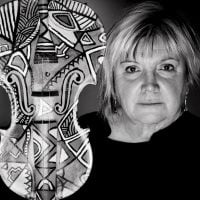View this post on Instagram
In the wake of the Uvalde shooting, I have been reading about mass shootings and the individuals who commit them.
It’s not been easy or comfortable reading, but I was following a compulsion to try to understand.
Dunblane. Port Arthur. Sandy Hook.
Mass murders that changed lives and countries forever.
I was living in the U.K. at the time of the Dunblane mass shooting. I felt the waves of shock and grief that rocked the country. I felt the devastating incomprehension. Why would anybody do this?
Shortly after Dunblane came Port Arthur, where I now own a log cabin. This remote, peaceful, little corner of Tasmania still feels the tragedy. At the Port Arthur Historic Site, the Memorial Garden stands where the cafe once stood. The cafe where so many lost their lives. The Garden is a place of profound sadness. The Port Arthur Site was originally a convict prison, so it’s no stranger to atrocity and cruelty. Visiting it is always a reminder, at least to me, that such cruelty must be remembered in order to learn its lesson. And yet on that unthinkable day in 1996, 35 people were massacred. Why would anybody do this?
I have no personal connection with the Sandy Hook shooting. Nevertheless, the tears came as I read about it. Children senselessly robbed of their future. Why would anybody do this?
Both Australia and the U.K. have introduced tighter gun control laws as a result of these events. These measures weren’t universally popular, but the majority were in favour. Both countries also operated a gun buyback scheme, which removed large numbers of weapons from the community. Despite these measures, both countries have seen mass killings since, but these are—thankfully—a rarity.
The United States has not introduced tighter gun law restrictions—the right to bear arms is part of their constitution. It is a right that is fiercely guarded by a powerful minority, and any change to gun laws has so far been successfully resisted. They claim, rightly, that it’s not the guns that commit the crimes, but the people. Nevertheless, mass shootings in the U.S. are an ever present fear for everyone who lives there.
How does hatred and rage build to such an extent that an individual feels the need to commit mass murder? That question seems just as important as the regulation of gun laws. It’s a question that we need to think about wherever we live; hatred and rage don’t recognise boundaries.
We have built a society in which hatred and rage flourish. A judgmental society that has rigid definitions of success, beauty, and social acceptability that we ignore at our peril. If we don’t conform, or we are born different, we risk ostracism, loneliness, and isolation, breeding grounds for hatred and rage—breeding grounds for mental illness.
The uncomfortable truth is that we’re all complicit in this. Our deeds matter. Our words matter. Our thoughts matter. A kind or an unkind word can turn a day around. Turn a life around. Everybody has the right to feel comfortable in their skin and to feel they have a place in the world. Nobody should have to feel worthless because they fail exams, suck at sports, or have to shop at the plus-size shop.
Is there anyone in the world who can honestly claim, hand on heart, that they have never hurt another person? Never spoken an unkind or thoughtless word? Never, knowingly or unknowingly, excluded someone?
Of course, one regrettable experience will not drive a person to despair, suicide, or mass murder. But a lifetime of being subjected to unkindness, misunderstanding, and exclusion can cause pain beyond bearing. With nowhere else to go and no one to listen to it, that pain can become hatred and rage. And hatred and rage need an outlet.
Those three young men—Thomas Hamilton, Martin Bryant, and Adam Lanza—were not born evil. They were driven to evil by a level of hatred and rage that is impossible to comprehend. Reading their stories was a stark revelation that society let them down.
This is not to excuse what they did. But as I read, I developed a real sympathy for these three injured and damaged humans. Their deeds were unconscionable, but their lives were heartbreaking. The heartbreak is at least as important as the gun laws. Well-adjusted humans do not randomly commit murder just because the guns are there.
As I read, I came to the difficult conclusion that every single one of us has a responsibility to be a part of the solution. We need to be there for others. To listen instead of judging. To take the time to understand individuals instead of just sticking a label on them. We need to have different markers for success. We pursue wealth, power, glamour, and high achievement at the cost of our humanity, and while we do so, we will continue to breed rage and hatred.
Before you write me off as an ageing hippy with a diminishing grasp of reality, consider this:
The pursuit of wealth and power has caused unimaginable harm through exploitation, greed, and irreparable damage to our planet. The relentless pursuit of growth has placed a burden on resources that has left millions starving and in need and led to an epidemic of inhumane farming practices. The age of technology has brought with it a crisis of loneliness, isolation, and inadequacy. The need for a kinder, more humanistic society has never been greater.
Gun laws matter—of that I am certain. But so do we—our thoughts, our actions, and our words. We need to understand that if we aren’t consciously trying to be part of the solution, then we are part of the problem. We need to say no to hatred and rage.
~
Please consider Boosting our authors’ articles in their first week to help them win Elephant’s Ecosystem so they can get paid and write more.











Read 16 comments and reply